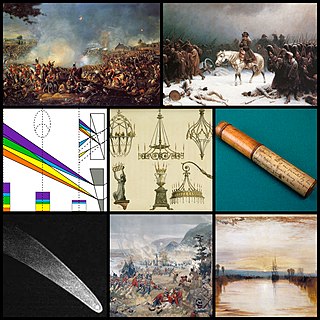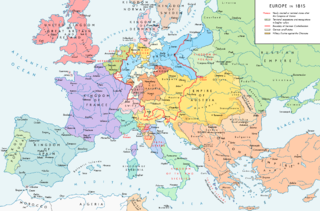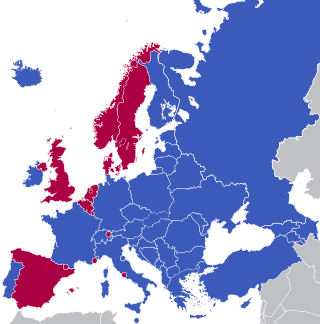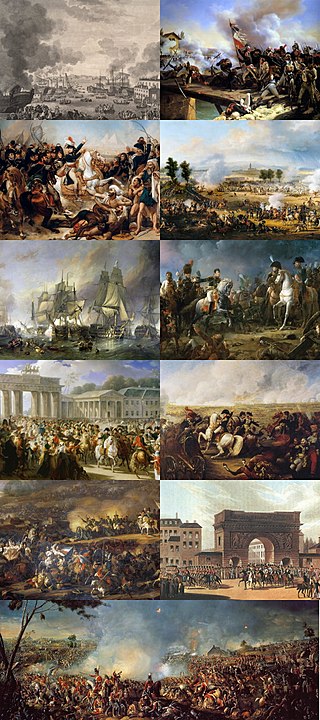The United Kingdom is a country located off the north-western coast of continental Europe.
Contents
United Kingdom may also refer to:
The United Kingdom is a country located off the north-western coast of continental Europe.
United Kingdom may also refer to:
A monarch is a head of state for life or until abdication, and therefore the head of state of a monarchy. A monarch may exercise the highest authority and power in the state, or others may wield that power on behalf of the monarch. Usually a monarch either personally inherits the lawful right to exercise the state's sovereign rights or is selected by an established process from a family or cohort eligible to provide the nation's monarch. Alternatively, an individual may proclaim themself monarch, which may be backed and legitimated through acclamation, right of conquest or a combination of means.

The 1810s was a decade of the Gregorian calendar that began on January 1, 1810, and ended on December 31, 1819.
Restoration is the act of restoring something to its original state and may refer to:

The Congress of Vienna of 1814–1815 was a series of international diplomatic meetings to discuss and agree upon a possible new layout of the European political and constitutional order after the downfall of the French Emperor Napoleon Bonaparte. Participants were representatives of all European powers and other stakeholders, chaired by Austrian statesman Klemens von Metternich, and held in Vienna from September 1814 to June 1815.

The Napoleonic Wars (1803–1815) were a series of conflicts fought between the First French Empire under Napoleon (1804–1815), and a fluctuating array of European coalitions. The wars originated in political forces arising from the French Revolution (1789–1799) and from the French Revolutionary Wars (1792–1802), and produced a period of French domination of Continental Europe. There were seven Napoleonic Wars, five named after the coalitions that fought Napoleon, plus two named for their respective theatres: (i) the War of the Third Coalition (1803–1806), (ii) the War of the Fourth Coalition (1806–1807), (iii) the War of the Fifth Coalition (1809), (iv) the War of the Sixth Coalition (1813–1814), (v) the War of the Seventh Coalition (1815), (vi) the Peninsular War (1807–1814), and (vii) the French invasion of Russia (1812).

The history of Denmark as a unified kingdom began in the 8th century, but historic documents describe the geographic area and the people living there—the Danes—as early as 500 AD. These early documents include the writings of Jordanes and Procopius. With the Christianization of the Danes c. 960 AD, it is clear that there existed a kingship. Queen Margrethe II can trace her lineage back to the Viking kings Gorm the Old and Harald Bluetooth from this time, thus making the Monarchy of Denmark the oldest in Europe. The area now known as Denmark has a rich prehistory, having been populated by several prehistoric cultures and people for about 12,000 years, since the end of the last ice age.
Act of Union may refer to:
The Treaty of London or London Convention or similar may refer to:

A crown prince or hereditary prince is the heir apparent to the throne in a royal or imperial monarchy. The female form of the title is crown princess, which may refer either to an heiress apparent or, especially in earlier times, to the wife of the person styled crown prince.

The Napoleonic era is a period in the history of France and Europe. It is generally classified as including the fourth and final stage of the French Revolution, the first being the National Assembly, the second being the Legislative Assembly, and the third being the Directory. The Napoleonic era begins roughly with Napoleon Bonaparte's coup d'état, overthrowing the Directory, establishing the French Consulate, and ends during the Hundred Days and his defeat at the Battle of Waterloo. The Congress of Vienna soon set out to restore Europe to pre-French Revolution days. Napoleon brought political stability to a land torn by revolution and war. He made peace with the Roman Catholic Church and reversed the most radical religious policies of the Convention. In 1804 Napoleon promulgated the Civil Code, a revised body of civil law, which also helped stabilize French society. The Civil Code affirmed the political and legal equality of all adult men and established a merit-based society in which individuals advanced in education and employment because of talent rather than birth or social standing. The Civil Code confirmed many of the moderate revolutionary policies of the National Assembly but retracted measures passed by the more radical Convention. The code restored patriarchal authority in the family, for example, by making women and children subservient to male heads of households.
A personal union is the combination of two or more states that have the same monarch while their boundaries, laws, and interests remain distinct. A real union, by contrast, would involve the constituent states being to some extent interlinked, such as by sharing some limited governmental institutions. Unlike the personal union, in a federation and a unitary state, a central (federal) government spanning all member states exists, with the degree of self-governance distinguishing the two. The ruler in a personal union does not need to be a hereditary monarch.
The Netherlands is a country located in Northwestern Europe.
A colonial empire is a collective of territories, either contiguous with the imperial center or located overseas, settled by the population of a certain state and governed by that state.

Monarchy was the prevalent form of government in the history of Europe throughout the Middle Ages, only occasionally competing with communalism, notably in the case of the Maritime republics and the Swiss Confederacy.
A country is a geopolitical area–often synonymous with a sovereign state.
Real union is a union of two or more states, which share some state institutions in contrast to personal unions; however, they are not as unified as states in a political union. It is a development from personal union and has historically been limited to monarchies.

British–Danish relations are foreign relations between the United Kingdom and Denmark. The United Kingdom has an embassy in Copenhagen and Denmark has an embassy in London. Both countries are full members of Council of Europe and NATO.

The monarchy of Denmark is a constitutional institution and a historic office of the Kingdom of Denmark. The Kingdom includes Denmark proper and the autonomous territories of the Faroe Islands and Greenland. The Kingdom of Denmark was already consolidated in the 8th century, whose rulers are consistently referred to in Frankish sources as "kings". Under the rule of King Gudfred in 804 the Kingdom may have included all the major provinces of medieval Denmark.

The French Revolutionary and Napoleonic Wars, sometimes called the Great French War, were a series of conflicts between the French and several European monarchies between 1792 and 1815. They encompass first the French Revolutionary Wars against the newly declared French Republic and from 1803 onwards the Napoleonic Wars against First Consul and later Emperor Napoleon Bonaparte. They include the Coalition Wars as a subset: seven wars waged by various military alliances of great European powers, known as Coalitions, against Revolutionary France – later the First French Empire – and its allies between 1792 and 1815: